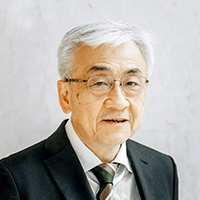
Greetings from the New JCI President
On June 18, 2024, I was nominated to succeed President Nishiyama as the 31st President of the Japan Concrete Institute at an extraordinary board meeting, and I humbly accepted this role on the same day. I am acutely aware of my limitations, but I intend to devote myself to the development of JCI and to meet the expectations of society over the next two years, together with all our members.
Over the past 40 years, from my student days to the present, I have been engaged in education and research at four universities in Japan and abroad. Through JCI, I have had the opportunity to interact with members active in various fields and professions, whether in construction materials, design planning, or supervision and management, and I feel that I have been nurtured in an arena that transcends fields, organizations, and professions. To date, I have served on the Research Committee, the Editorial Committee, and as the Chair in charge of the Science and Research Section. Although I do not have extensive experience in managing JCI's affairs, I intend to focus my efforts on the immediate issues inherited from my predecessors (such as DX/digitalization, establishing an environment for the continuity of the certification system, and strengthening member services) as well as short- to medium-term issues (such as reducing energy use and environmental impact, improving productivity, and fostering and supporting human resources).
In recent years, I have served as facilitator for a council on improving productivity related to design and construction. We are faced with urgent issues, including societal demands for concrete-related projects, a declining workforce, work style reforms, rising material and labor costs, and major changes in the areas of resources, energy, and environmental impact. In this context, it is essential for the many stakeholders involved in concrete-related projects to find productive compromises and create a flow wherein all the gears mesh and move together smoothly. I have come to realize over the past few years that mutual understanding based on the sharing of high-quality information is indispensable to achieve an arrangement in which all players can cooperate while preserving independence and decentralization. JCI comprises members and organizations engaged in cement, admixtures, aggregates, ready-mixed concrete, design and construction, inspection and supervision, maintenance and renewal, with professions that span specialized skills, technology, planning, management, and education. This very diversity is what characterizes JCI and constitutes our potential, and I would like to further enhance our strengths as a forum with all of you. This aligns with the philosophy of the Japan National Council on Concrete (JANACC), which was established in 1965 and is the origin of JCI.
However, accepting differences and collaborating through mutual understanding is easier said than done, as many academic societies and associations both domestically and internationally well know. If left to nature, the tendency to cluster in familiar fields or professions is something that academic societies cannot escape. Taking these factors into consideration, various rules have been established regarding the executive structure of committees and projects. Reflecting the rise of the information society and the current environment of concrete engineering, we are receiving feedback from our members about the need to strengthen the diversity of JCI's activities. I look at information technology as an enabler that will help us keep up the transmission and advancement of technologies and skills.
I would like to take this opportunity to again express my respect for the dedicated efforts by former President Prof. Junichiro Niwa, former President Prof. Minehiro Nishiyama, and former Executive Director Dr. Yoshinobu Nobuta, as well as all the directors, auditors, and members of the Headquarters and Chapters in managing the affairs of JCI over the three years of the coronavirus pandemic. This period, which saw success in bringing activities online, also reaffirmed the significance of the analog world, and it appears that the importance of casual daily conversations in connecting organizations and society is now being increasingly recognized. Experience tells us that in challenging times, predictions about the future often come true. Now is a good time to take action. I invite you all to join me in creating a stronger forum for co-creation and overcoming any challenges we may encounter on our way to using the results of research and development to solve social problems.
Koichi Maekawa
31st President, Japan Concrete Institute
(Visiting Professor, Yokohama National University, Professor Emeritus, The University of Tokyo)







